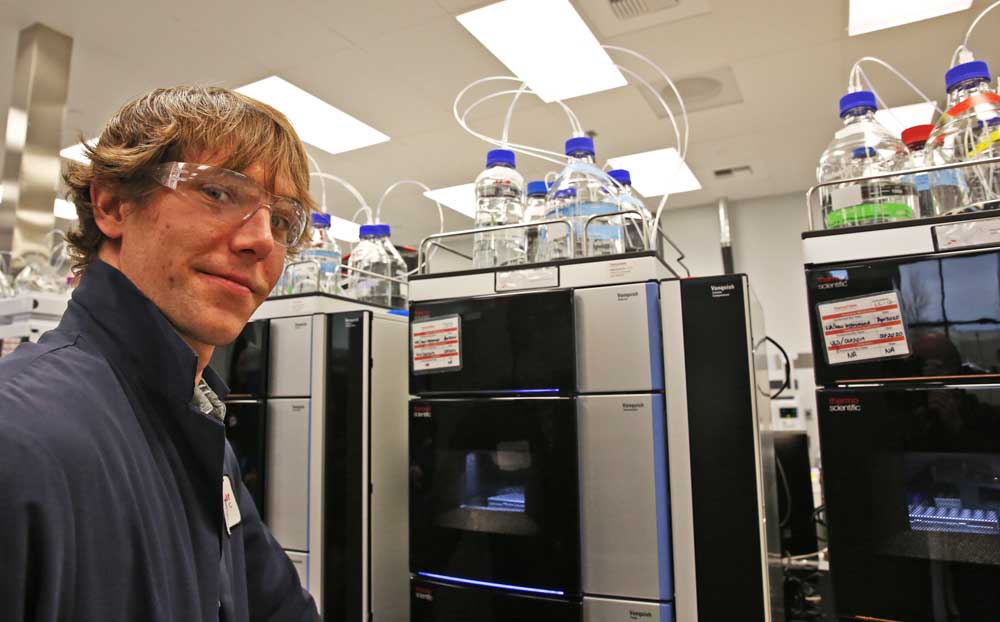Businesses draw upon workers from OSU-Cascades partnership
Published 3:30 am Sunday, December 22, 2019

- James Taylor, an OSU-Cascades graduate, is employed at Thermo Fisher Scientific in Bend.
Persistence paid off for James Taylor.
Armed with a biology degree from Oregon State University-Cascades in 2018, Taylor had never visualized what he’d do to make a living. He applied around town, and today works on the manufacturing of early development pharmaceuticals at Thermo Fisher Scientific in Bend.
It’s all because of partnerships between Bend businesses and OSU-Cascades. Just at Thermo Fisher Scientific alone, six recent OSU-Cascades graduates are employed.
Creating a skilled workforce to suit industry demands is one of the main missions of OSU-Cascades, which has been on its own campus in Bend since 2016. While a strong education and business tie may not ever fully eliminate the need for importing skilled workers, it’s important to create an educated workforce.
“Despite having a four-year educational system here, there will always be a need to import skilled workers into Central Oregon,” said Damon Runberg, Oregon Employment Department Regional Economist. “A four-year university helps skill up our local workforce, but they don’t have the capacity to singlehandedly produce enough graduates that local businesses are demanding.”
Having Central Oregon graduates join Bend-based technology business is exactly what Roger Lee, CEO of Economic Development for Central Oregon, had hope for.
“We’ve found OSU-Cascades to be very responsive, even entrepreneurial, to help meet the needs of local industry and employers, creating degree programs and academic curriculum from direct outreach to businesses about what specific skills are needed,” Lee said.
Partnership pairing
When OSU-Cascades President Becky Johnson arrived in 2009, she met with business leaders to learn about their workforce needs. Of particular need were graduates from STEM (science, technology, engineering and math) fields, Johnson said.
“We didn’t have the programs to address those needs,” Johnson said. “We’ve been working to develop these programs. But we can’t meet the needs completely in technology. … We’re trying to scale the programs to meet the needs.”
Businesses and organizations are helping by providing funding to bolster degree programs at the young Central Oregon campus. These organizations have supported degree programs like biology, computer science, energy systems, engineering and hospitality management. Bend-based companies like Lonza, Grace Bio-Labs, Suterra LLC, VR Analytical and Amplion Inc. also hire student interns.
“Internship positions give both the student and the industry a chance to try each other out,” Johnson said. “Internships are important in the STEM fields; it’s important for the student and the employer.”
While it is expensive for businesses to import labor, businesses still hire outside the area.
“We’re a relatively small area, and our rates of growth have been so fast,” Runberg said. “It’s a big advantage of a local economy that we have the capacity to attract workers from other areas. It’s dramatically transformed our economy because we can attract these highly skilled workers to Bend and Redmond.”
The Thermo Fisher story
With $24 billion listed in revenues and employing 70,000 people worldwide in 2018, according to the company’s website, Thermo Fisher Scientific’s presence in Bend has grown too. As a pharmaceutical and biotechnology firm, it employed 15 workers in 2012 in Bend, but today has 104 and is looking to expand, said Jamie James, Thermo Fisher Scientific analytical development manager.
It’s a question of talent retention, James said. Newcomers to Bend might not like the small -town feel, the remoteness from big cities like Portland. That’s where hiring locally helps with retention.
Cheyenne Hall, another OSU-Cascades biology student, got her job in human resources from an internship program. That was more than two years ago. Each year the company selects four interns.
Not bad for a 23-year-old.
“OSU did a great job telling students when jobs or internships are available,” Hall said. “I knew I wanted to be in the science, health care or pharmaceutical field. But when I took organic chemistry, I realized that I didn’t like lab work. But I do love the business side of science.
“It’s the best thing that ever happened to me.”
Using local talent creates a community, said Eric Mettler, Thermo Fisher Scientific’s human resources manager. When a company hires someone, there’s costs involved, and if that new hire doesn’t find Bend suitable, they move on, which costs a company in turnover, Mettler said.
That’s where the internships help.
“Internships provide a base-level experience,” James said. “We get to base train them and if they become full-time employees, they can hit the ground running.”
In Bend, the internship fits the company because its been growing and adding jobs, Mettler said.
The future
Taylor is happy in his position. He is making a good living, paying rent, buying a new car and paying student loan debt.
“When I graduated, I knew I loved chemistry, but I had no idea I’d be working at Thermo Fisher Scientific” said Taylor, 28. “I ‘ve always been open to opportunity, and I seize and grab any moment I can and try to make the best of what I’ve been given.”
Today he’s thinking about going on to graduate school next year and maybe staying with Thermo Fisher Scientific because they have an educational program.
Meanwhile, Hall, who’s been carrying a full-time student load of courses and working, sees herself at Thermo Fisher Scientific for a while.
“Five years from now,” Hall said, “I see myself growing in my HR role here.”
How to snag an internship or job fresh out of college:
*Familiarize yourself with the business you’re applying to.
* Apply often.
*Seek internships.
*Practice interviewing on the phone.
Source: OSU-Cascades students






